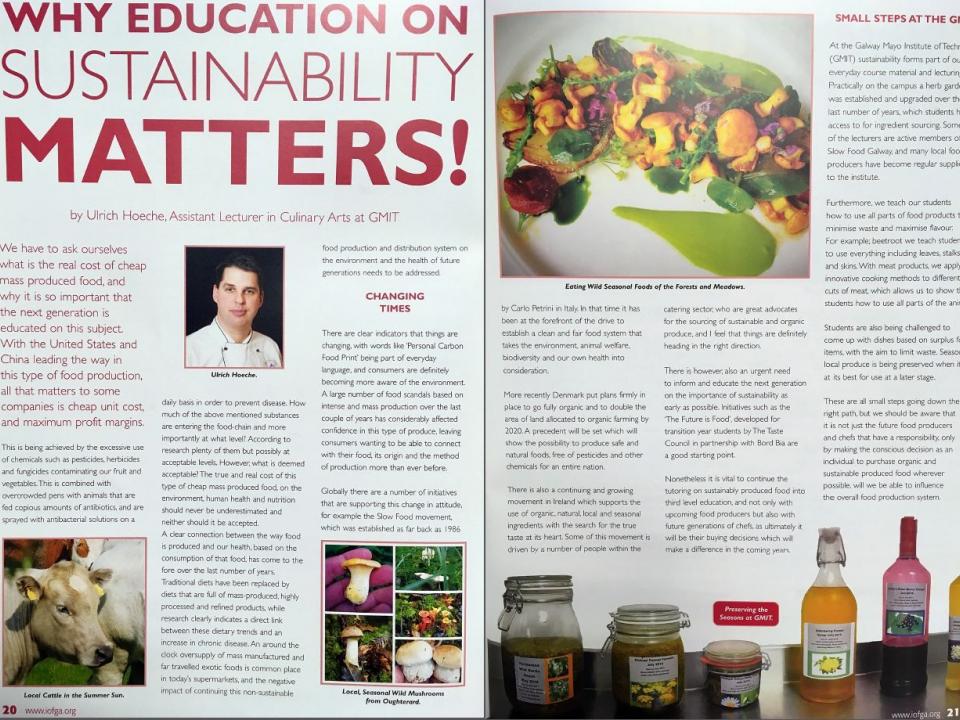Why education on sustainability matters!
The Winter 2016 edition of Organic Matters Magazine (Issue 135) features an article and photos by assistant lecturer in Culinary Arts at GMIT, Ulrich Hoeche. The article focuses on the importance of sustainability in the food industry, and in education.
Why education on sustainability matters!
We have to ask ourselves what is the real cost of cheap mass produced food and why the next generation needs to be educated on this subject. With the United States and China leading the way in this type of food production, all that matters to some of the companies is cheap unit cost and maximum profit margin. This is being achieved by the excessive use of chemicals like pesticides, herbicides and fungicides contaminating our fruit and vegetables, as well as overcrowded pens with animals that are been fed a continuous amount of antibiotics and are sprayed with antibacterial solutions on a daily basis in order to prevent disease. How much of the above mentioned substances are entering the food-chain and at what level? According to research plenty of them but possibly at acceptable levels. However, what is deemed acceptable? The true and real cost of this type of cheap mass produced food, on the environment, human health and nutrition should never be underestimated and neither should it be accepted.
A clear connection between the way food is produced and our health based on the consumption of that food has come to the fore, over the last number of years. Traditional diets have been replaced by diets that are full of mass-produced, highly processed and refined products, while research clearly indicates a direct link between these dietary trends and an increase in chronic disease. An around the clock oversupply of mass manufactured and far travelled exotic foods is common place in today’s supermarkets and the negative impact of continuing this non-sustainable food production and distribution system on the environment and the health of future generations needs to be addressed.
There are clear indicators that things are changing, with words like ‘Personal Carbon Food Print’ being part of everyday language and consumers becoming more aware of the environment. A large number of food scandals based on intense and mass production over the last couple of years have also affected confidence in this type of produce considerably, leaving consumers wanting to be able to connect with their food, its origin and the method of production more than ever before.
Globally there are a number of initiatives that are supporting this change in attitude, for example the Slow Food movement which was established as far back as 1986 by Carlo Petrini in Italy is at the forefront of the drive to establish a clean and fair food system that takes the environment, animal welfare, biodiversity and our own health into consideration.
More recently Denmark put plans firmly in place to go fully organic and to double the area of land allocated to organic farming by 2020. A precedent will be set which will show the possibility to produce safe and natural foods, free of pesticides and other chemicals for a whole nation.
There is also a continuing and growing movement in Ireland which supports the use of organic, natural, local and seasonal ingredients with the search for the true taste at its heart. Some of this movement is driven by a number of people within the catering sector, which are great advocates for the sourcing of sustainable and organic produce and things are definitely heading in the right direction.
There is however also an urgent need to inform and educate the next generation on the importance of sustainability as early as possible, and initiatives like the ‘The Future is Food’ developed for transition year students by The Taste Council in partnership with Bord Bia are a good starting point. Nonetheless it is vital to continue the tutoring on sustainably produced food into third level education, and not only with upcoming food producers but also with future generations of chefs as it will be their buying decisions which will make a difference in the forthcoming years.
At the Galway Mayo Institute of Technology sustainability forms part of our everyday lecturing. A herb garden was established and upgraded over the last number of years, which students have access too. Some of the lecturers are active members of Slow Food Galway, and many local food producers have become suppliers to the institute. Furthermore we teach our students how to use all parts of a particular vegetable, for example beetroot including leaves storks and skins as well as applying innovative cooking methods to different cuts of meat, which allows us to show the students how to use all parts of the animal. Students are also being challenged to come up with dishes based on surplus food items, with the aim to limit waste, and seasonal local produce is being preserved when it is at its best for the use at a later stage. These are all small steps going down the right path, but we should be aware that it is not just the future food producers and chefs that have a responsibility, only by making the conscious decision as an individual to purchase organic and sustainable produced food wherever possible, will we be able to influence the overall food production system.
